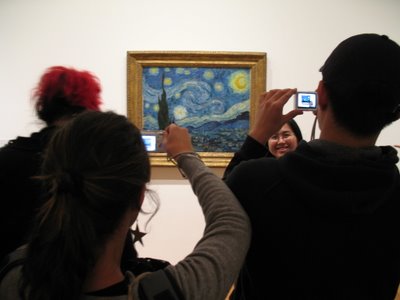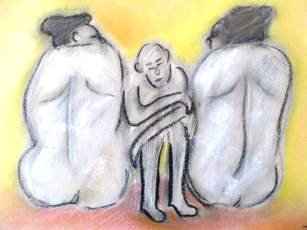Slap And Tickle In Novels

I don't want to be crass and offend the taste of ordinary folk. Or maybe I do? This has always been a difficult point for me when considering the novel I want to write. What do we do when the characters need to get close? I mean, sweaty close? Some people don't make it easy for us.
The Literary Review has just announced this year's Bad Sex in Fiction Award. The hapless winner - though they normally bask in the limelight and their profile increases markedly - is Iain Hollingshead, for a passage from his book Twenty Something. Here's the offending bit, which the judges are supposed to have found unnecessary and cringe-evoking, if that's a proper term:
She's wearing a short, floaty skirt that's more suited to July than February. She leans forward to peck me on the cheek, which feels weird, as she's never kissed me on the cheek before. We'd kissed properly the first time we met. And that was over three years ago.
But the peck on the cheek turns into a quick peck on the lips. She hugs me tight. I can feel her breasts against her chest. I cup my hands round her face and start to kiss her properly, She slides one of her slender legs in between mine. Oh Jack, she was moaning now, her curves pushed up against me, her crotch taut against my bulging trousers, her hands gripping fistfuls of my hair. She reaches for my belt. I groan too, in expectation. And then I'm inside her, and everything is pure white as we're lost in a commotion of grunts and squeaks, flashing unconnected images and explosions of a million little particles.
Now, I agree that sex in a novel just for the sake of having a bit of sex in a novel leaves me cold. And how many people can write good love-making scenes? And how graphic should they be? How honest? Do we care? Are we turning readers off? Should we even be posing the question, as encouraged by The Literary Review?
I have a sex scene in the novel I am trying to sell, but I argue that it is necessary to show a crucial turning point: my protagonist has been grappling with a kind of impotence and it's near the end of the book that this is confronted "head on". I have to admit that I found it difficult trying to get the right balance, to neither go overboard nor shy away from the task at hand. I also wondered about what the reaction of the reader would be, let alone think about the reaction of those respectable people who know me and think that I am such a "nice young man".
I would be interested in getting your reactions to this short scene. I will be happy to accept next year's Bad Sex in Fiction award, because it will mean that my book is on the shelves! So, sit yourself down and dim the lights. Here it is:
He didn’t know how it happened. One minute they were coy and reclining, quite a way from each other, him going through the details of the past few days, and the next thing he was dragging his firm lips across her neck, pulling her hands down away from her fringe. He couldn’t tell who started it. His heart raced. His legs ached. She was composed and still, seeming to wait for his movements and initiatives. The
connection sent small charges into his skin.
‘You smell good,’ he said. ‘You smell so good.’ He tenderly bit her wrists and then held them up to the light, as though he needed to verify that it really was her, the raising up of a glittering, coveted prize. Her fingers seemed long and delicate like chopsticks. The soft hair on her arms lit up like sparkle dust. She stayed loose and showed no resistance, seeming to leave everything up to him.
She pushed down the top of her jeans, letting her head tumble back. A small metal ball in her bellybutton suddenly appeared like a beacon of light. He went down onto his knees and took it between his teeth; he never imagined a piercing would ever excite him. She reached into her back pocket and pulled out a condom wrapped in a black wrapper, which she hastily tore open. He was ready. It must’ve been the first
time in 18 months that he’d actually gone hard when consumed by the promise of sex. Then he was petrified that his ruminations would cause him to lose his nerve. His trousers fell easily, the button already undone after his massage with Didier. With style, he unrolled the condom effortlessly onto his glory and then eased Sandy down onto the sofa, slipping a cushion beneath her head.
‘I want you to be gentle,’ she whispered. ‘I want something loving.’
He nodded and teased off her top, and noticed that she smelt of peaches. She raised her head and kissed him on the lips, which surprised him. She whispered something, but it was broken up by the kisses. She breathed into his mouth and seemed to fill him with something powerful. When he wrenched himself up on top of her he was pleased to feel that he was still hard, his glory pushing into her inner thigh. He placed her right arm up behind her head and buried his nose in her armpit – that was something he’d loved doing in his early days with Joyce. She giggled and told him to stop. She was thin across her stomach and around her thighs, yet her thick coating of skin and her ample breasts were enough for him to hold onto and move under his palms. He never liked it when the skin was too taut and a woman didn’t move with him. He loved to explore something of substance.
He was inside her, before he even had time to reflect on whether he was ready to make the connection. The way they fell into each other seemed so right, as if there were no other position they could’ve taken up. His euphoria was increased when she moved beneath him, flexing the muscles around her groin. Her hands made delicate journeys across the divide of his back, spreading the perspiration around like massage oil. She writhed faster beneath him, her mouth wide and surrendered. She fully stretched, making the exposed cords and muscles in her neck seem like the base of a giant kauri tree, looking splendid under the light of the moon. He fell
backwards and saw whiteness, pure and plain whiteness, a warm glow that seemed to completely energise him.
They lay still for five minutes without talking, their arms and legs entwined, perspiration running like streams across their bodies, a soft after-sex smell hanging over them. He could feel a mosquito biting him on his side, but he made no
effort to remove it. He’d been rendered far too docile to react to anything. He coasted off into a light sleep and enjoyed the sensation of being lifted up high into the air. He’d been liberated from something, brought out of a cold cave
and into the warm light of day.
Copyright, 2006. Shameless Words.


























































